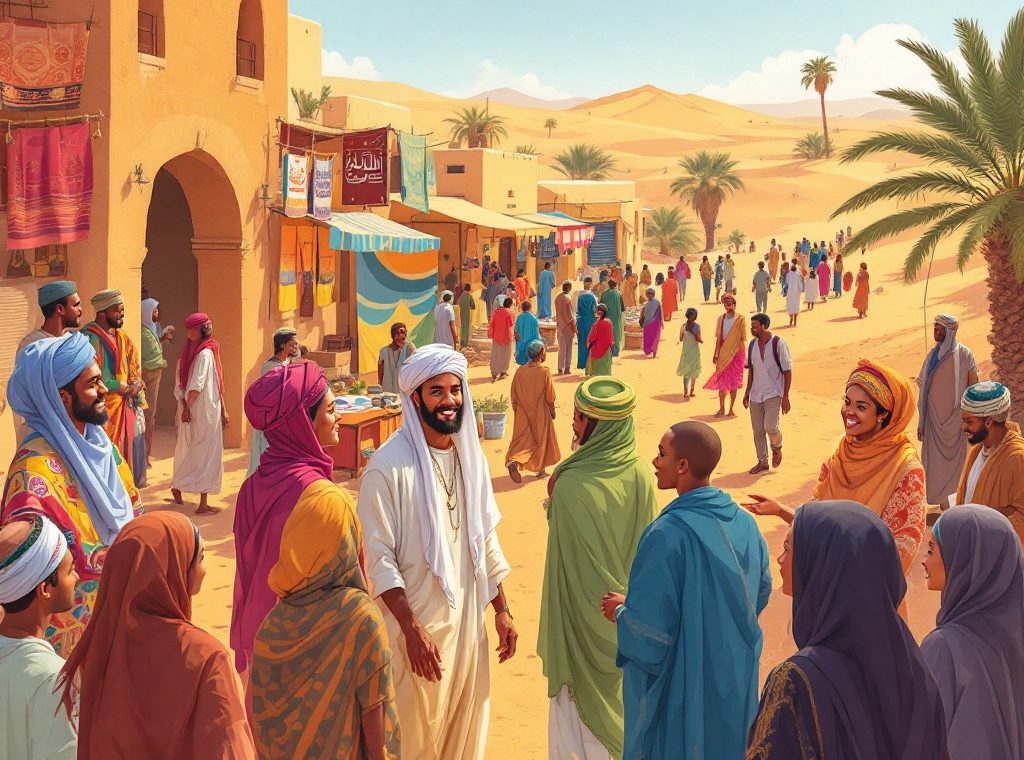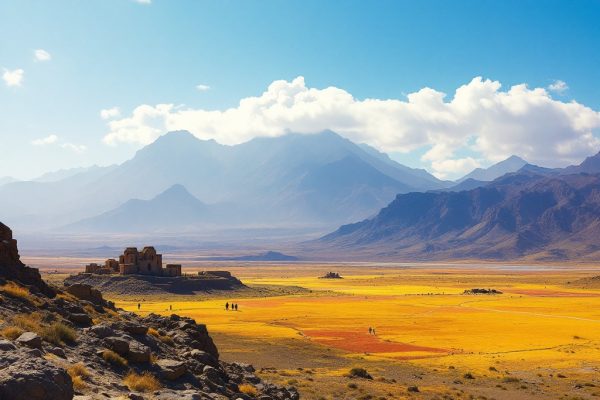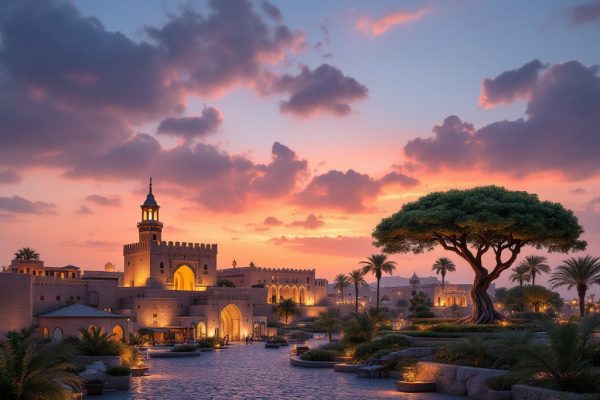Study Arabic in Mauritania: Learn a Few Basic Phrases in Arabic
Want to unlock the rich culture and history of Mauritania? Learning Arabic, the official language, is your key. Spoken by over 225 million people globally, Arabic offers incredible personal and professional opportunities. This article guides you through learning Hassaniya Arabic, the unique dialect of Mauritania, from greetings and introductions to everyday phrases and effective learning strategies. Discover how to immerse yourself in the language, connect with locals, and build a strong foundation for communication. Start your Arabic language journey today and open doors to a world of possibilities!
Important information

- Arabic is the official language of Mauritania, crucial for daily life and understanding the culture.
- Hassaniya, the local Arabic dialect, blends classical Arabic with Berber and French influences.
- Daily practice, especially with native speakers, is key to fluency.
- Online resources and language exchange programs are helpful learning tools.
- Learning even a few basic Arabic phrases enhances travel and cultural immersion.
Why Study Arabic in Mauritania?
Learning Arabic opens doors to a deeper understanding of Mauritania. As the official language, it’s key for navigating daily life and appreciating the country’s rich cultural heritage, connecting you with its history and traditions. Speaking Arabic enables authentic interactions with locals, enriching your travel experience. Furthermore, Arabic’s global presence (spoken by over 225 million people) creates remarkable personal and professional opportunities, fostering valuable global citizenship.
Importance of Learning Arabic in Mauritania
Arabic is essential to life in Mauritania, serving as the official language and a key to daily interactions. Learning it unlocks a deeper understanding of the region’s rich history and cultural traditions, fostering connections with locals. This knowledge also enhances academic pursuits and simplifies everyday tasks, from navigating the marketplace to building meaningful relationships. Moreover, understanding Arabic allows you to appreciate local customs with greater nuance. Beyond personal benefits, Arabic unites communities and bridges cultures within Mauritania, creating a richer, more immersive experience for everyone.
Cultural Immersion and Its Benefits
Immersing yourself in Mauritanian culture accelerates your Arabic language acquisition. Conversing with native speakers provides invaluable real-world practice, significantly expanding your vocabulary. Moreover, this immersion deepens your understanding of the culture, enriching and adding meaning to your learning journey. Mauritania offers a unique opportunity to immerse yourself in Arabic, fostering rapid language development. Interacting daily with locals sharpens your conversational skills, while the rich cultural context makes learning more engaging and memorable. The blend of language and cultural immersion creates a powerful synergy, accelerating your progress and leaving you with a deeper appreciation for both the language and the Mauritanian way of life.
Introduction to Hassaniya Arabic
Hassaniya Arabic is primarily spoken in Mauritania, and also extends to parts of Western Sahara, southern Morocco, and southwestern Algeria. This dialect uniquely blends classical Arabic with local influences, creating a distinct linguistic form named after the historically significant Beni Hassan tribe. Its vocabulary reflects the rich culture and history of the region.
Spoken primarily in Mauritania, Hassaniya Arabic incorporates elements of Berber and other dialects, resulting in distinctive pronunciation and grammatical structures. Using the standard 28-letter Arabic alphabet, written right to left, Hassaniya has some unique pronunciations that differentiate it from Modern Standard Arabic. While Hassaniya’s grammar shares similarities with other Arabic dialects, it also boasts unique features. Its vocabulary, enriched by borrowed words from Berber and French, adds to its unique character.
What is Hassaniya?
Hassaniya Arabic, spoken in Mauritania, Western Sahara, and parts of neighboring Mali, Senegal, and Algeria, is a distinct dialect. While rooted in Arabic, Berber languages have heavily influenced its vocabulary and pronunciation, setting it apart from other Arabic varieties. This reflects a rich cultural mix.
The Alphabet: Learning the Basics
The Hassaniya Arabic alphabet, derived from the Arabic script, forms the foundation of Hassaniya writing. This alphabet is essential for anyone wishing to read or write the language.
Understanding Hassaniya Grammar and Vocabulary
Learning Hassaniya Arabic involves understanding its unique grammar and vocabulary. Key grammatical elements include verb conjugation, noun declension, and sentence construction. A strong vocabulary is also essential, starting with basics like numbers, time, and greetings, which form the basis for more advanced learning. While mastering Hassaniya Arabic takes effort, challenges like verb conjugation and pronunciation can be overcome with practice. Start learning today and gradually build your skills to see quick progress.
Learning Arabic Script and Pronunciation
Arabic is read from right to left.
Consistent practice is crucial for fluency, especially since pronunciation can be challenging.
Mastering unique sounds not found in other languages is key.
Language learning apps can be helpful tools.
Converse with native speakers for significant improvement.
Reading Arabic Script: Tips and Techniques
Learning Arabic starts with mastering its unique alphabet. Each letter changes form depending on its position in a word: beginning, middle, end, or standalone. Practicing these forms is key to reading well. Regular practice, especially daily conversations with native speakers, greatly improves fluency. Language learning apps are helpful, but immersion speeds up learning. Enjoy Arabic media like music and TV, and grab chances to chat in Arabic every day. Here’s a structured approach:
Master the Arabic Alphabet. Each letter has different forms depending on its position within a word (beginning, middle, end, or standalone).
Practice Consistently. Daily interaction with native Arabic speakers significantly boosts your fluency.
Utilize Language Learning Apps. These apps offer valuable support and structured learning.
Immerse Yourself in Arabic Media. Engage with Arabic music, television, and other media to enhance your comprehension and vocabulary.
Seek Opportunities for Conversation. Use every chance to speak Arabic in everyday situations.
Arabic Pronunciation: Common Challenges
Arabic pronunciation poses challenges due to its unique sounds, such as emphatic consonants and gutturals, which are unfamiliar to many learners. Mauritania’s Hassaniya dialect introduces further complexities with its own distinct pronunciation features. Regular practice with native speakers and attentive listening are crucial for overcoming these pronunciation hurdles.
Dialectal variations from Modern Standard Arabic present additional obstacles. These include new vocabulary and grammatical structures.
The right-to-left Arabic script requires dedicated practice to master.
Basic Arabic Phrases for Everyday Use
In Hassaniya culture, greetings and introductions are essential. The customary Arabic greeting, “As-salamu alaykum” (“Peace be upon you”), is typically met with the response “Wa alaykumu s-salam” (“And upon you peace”). When parting ways, “Ma’a as-salama” serves as “Goodbye.” Introductions are straightforward. Simply state “Ismi (your name)” to convey “My name is (your name).” To inquire about someone’s name, use “Ma’a ismuki?” for women and “Ma’a ismuk?” for men.
Common Phrases
- Express gratitude with “Shukran” (“Thank you”).
- The appropriate reply to “Shukran” is “Afwan” (“You’re welcome”).
- Use “Min fadlak” for “Please”.
- “Na’am” signifies “Yes”.
- “La” means “No”.
Asking and Responding about Well-being
- To ask someone how they are, say “Kayfa halak?” to a male.
- Use “Kayfa haluki?” to ask a female how she is.
- A common response is “Bikhair, alhamdulillah,” which translates to “Fine, thanks to God”.
Beyond the standard “Ma’a as-salama,” other farewells exist. “Fi aman Allah,” for instance, means “Go with God’s safety.” You could also use “Ilal liqa’,” meaning “Until we meet again,” or offer a pleasant “Yawman saidan,” wishing them a good day.
Greetings and Introductions in Hassaniya
In Hassaniya culture, greetings are courteous and heartfelt. A typical exchange begins with “As-salamu alaykum” (peace be upon you), replied to with “Wa alaykum as-salam” (and upon you peace). To greet someone in the morning, say “Sbaḥ lḫir.” For afternoon or evening, “Messa lḫir” is appropriate. Introductions are straightforward. Simply state your name using “Ismi… (your name).” Inquire about someone else’s name with “Šnu smitek?” (What’s your name?). You can also introduce others by saying “hada…” (this is…).
Greetings
- Formal: “As-salamu alaykum” (peace be upon you), responded to with “Wa alaykum as-salam” (and upon you peace).
- Morning: “Sbaḥ lḫir.”
- Afternoon/Evening: “Messa lḫir.”
Introductions
- Introducing yourself: “Ismi… (your name).”
- Asking someone’s name: “Šnu smitek?” (What’s your name?).
- Introducing someone else: “hada…” (this is…).
Common Survival Phrases
Basic Needs:
- water,
- food,
- shelter.
Emergencies:
- help,
- I need a doctor.
Shopping:
- how much is this?
Polite Phrases:
- please,
- thank you,
- excuse me.
Key Locations:
- where’s the bathroom?
When Confused:
- I’m lost,
- I don’t understand.
Leave-taking Expressions
Bid farewell like a true Mauritanian with a heartfelt “Bislama,” “Ma’a as-salama” (meaning “with peace”), or “Fi aman Allah” (meaning “in God’s protection”). These respectful phrases offer a glimpse into the local culture and are a wonderful way to connect with people, demonstrating your appreciation for their customs.
Developing Communication Skills in Arabic
Daily conversation is crucial for learning Arabic. Immersing yourself by speaking with native Mauritanians provides invaluable practice. Using common Arabic phrases facilitates everyday interactions in various social settings.
Engage with the language daily. Try shopping or attending local events to reinforce your learning.
Use language exchange programs and apps. These provide additional opportunities to hone your skills.
Embrace the challenge of Mauritania’s diverse dialects and local slang. Overcoming these hurdles fosters cultural understanding and enhances communication, ultimately leading to greater fluency.
Practicing Everyday Conversation
Regular Hassaniya Arabic conversations are key to fluency and confidence. Chatting with native Mauritanians offers invaluable, practical experience, solidifying your learning.
Grammar and vocabulary become intuitive through consistent daily use, accelerating your overall progress.
Useful Expressions and Phrases
Mastering key Hassaniya Arabic phrases can significantly improve your communication and foster positive relationships within Mauritanian culture. For instance, the standard greeting “As-salamu alaykum” translates to “Peace be upon you“.
- To express gratitude, use “Shukran” (Thank you).
- When requesting something, use “Min fadlak” (Please).
The typical response to “As-salamu alaykum” is “Wa alaykum as-salam,” meaning “And upon you be peace“. The polite reply to “Shukran” is “Afwan” (You’re welcome).
Effective Strategies for Learning Arabic
Design a realistic study plan that seamlessly integrates into your daily routine. Prioritize short, consistent study sessions over marathon cramming. Dedicate specific times each day to Arabic, even if it’s just 15-30 minutes. This regular practice builds momentum and reinforces what you learn.
Expand your vocabulary
Learn two or three new Arabic words every day. Begin with common words and useful phrases. Repetition is crucial, so practice using these new words in sentences.
- Flashcards,
- language learning apps,
- traditional notebooks.
For instance, try incorporating greetings like “As-salamu alaykum” (peace be upon you) or “Ma’a as-salama” (goodbye).
Take advantage of online resources
Language learning apps and websites offer structured lessons and interactive exercises, allowing you to practice pronunciation and reinforce grammar. For a deeper dive, consider online Arabic courses. They provide more comprehensive instruction and often include opportunities for interaction. Language exchange programs offer another valuable avenue for practicing with native speakers, gaining real-world experience, and developing cultural understanding.
Setting a Study Schedule
Consistent daily practice is key to learning Arabic. Even short, regular sessions are more effective than sporadic long ones, reinforcing your learning and building a strong foundation. A daily 30-minute study period each morning is ideal, but even 15 minutes will yield positive results. This regularity not only strengthens your language skills but also cultivates effective study habits, making the learning process more enjoyable. Establish a routine and watch your Arabic fluency flourish.
Building Vocabulary: Two or Three Words a Day
Learn a few new Arabic words every day. Even two or three words will make a difference. This consistent practice builds up quickly, leading to noticeable vocabulary growth. This method strengthens long-term retention and improves fluency. Spaced repetition systems (SRS) can further enhance your memorization, making them a powerful tool for language learning.
Online Courses and Language Exchange Programs
Online courses offer a structured learning path, building a strong grammatical foundation.
They often include structured exercises, complementing real-world conversations.
Language exchange programs emphasize practical conversation with native speakers, providing invaluable real-world application.
This practical experience is essential for fluency.
Combining online courses with language exchange programs maximizes learning. It’s a powerful strategy for language acquisition.













